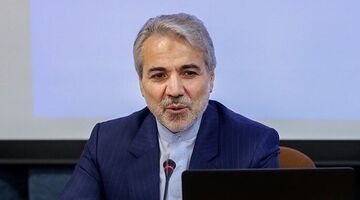TEHRAN(Bazaar) –The remarks of US President-elect, Joe Biden during the presidential debate on the fate and destiny of the US oil industry, have sparked heated debate Fitch Ratings announced two days ago that Joe Biden's victory in the US elections and his policy to reduce the consumption of fossil fuels and distance the US from these fuels will influence on the US oil and gas industry.
According to the Fitch report, Biden believes that climate change is a dangerous threat to the planet, and the transition from fossil fuels and the move to clean energy could be a new economic opportunity for the United States that US must be a pioneer in the field of clean energy technology.
Fitch also believes that while the Democrats have won the presidential race, Biden may not be able to pursue his policies because the Republican Party may control the Senate and given the party's support for the US oil and gas industry, Biden cannot advance this field of energy easily.
In this regard and based on the importance of the energy sector for the United States, Bazaar reporter spoke with Vandana Hari, the Founder of Vanda Insights, about the impact of Joe Biden's victory On the US oil and gas industry, the entrance of Iran and Venezuela into the oil market and its impact on falling prices, the amount of energy production with the presence of Biden which is different from Trump and Biden's approach to Saudi Arabia in the field of energy.
Vandana Hari has 25 years of experience providing intelligence on the global oil and gas markets to executives in the industry and related services, government officials and agencies, as well as wealth managers. Before launching Vanda Insights in September 2016, Vandana served as Asia Editorial Director at S&P Global Platts, a leading information provider on the global energy, petrochemicals, metals and agricultural markets.
In that role, she oversaw the regional commodities news and pricing operations and led the company’s business strategy and external stakeholder engagements. During her career with Platts, Vandana has assessed spot crude and refined product prices, covered news, and written research and analytical reports. Prior to Platts, Vandana served in various editorial positions in The Times of India, the South Asian magazine, and EDN Asia, an electronics design magazine in the Reed Business Information group. She writes a monthly column in the Nikkei Asian Review and is an insight provider on Smartkarma. Vandana’s expert views on the oil markets are regularly featured on TV and radio channels including Bloomberg, CNBC, BBC, Yahoo Finance, Al Jazeera and Singapore’s Channel News Asia.
Vanda Insights is as a Singapore-based provider of global oil markets macroanalysis.
Following is the text of the interview:
Bazaar: Some believe Biden's presence in the White House could make a significant difference in US oil and gas policies. One reason for this is his focus on renewable energy and the reduction of fossil fuels, and his return to the Paris climate agreement. What is your assessment?
Hari: Biden’s green energy agenda was clear in his election campaigning, but how much of it he is able to push through remains to be seen. If the Senate remains under Republican control, Biden will need to water down some of his climate initiatives. The domestic upstream sector has played a key role in the US’ energy independence, job-creation and booming oil and LNG exports.
In view of the need to accelerate the country’s post-Covid economic recovery, Biden will need to tread carefully on tightening regulations or removing the Trump-era incentives for oil and gas producers.
Bazaar: According to Biden, his policies will be similar to those of the Obama administration, which will likely mean the return of Iran and Venezuela as two members of OPEC and the lifting of US sanctions. Of course, this is provided that a way is provided to reduce the crisis between the United States and these two countries. In your opinion, with the entry of Iran and Venezuela into the oil market, will we see a drop in prices?
Hari: While Biden appears keen to attempt a rapprochement with Iran, his stance on Venezuela may be very different. Even on Iran, the current thinking is that it may take a few months for Biden to turn his attention to the matter; at the very least, his administration is expected to wait for the results of the June 2021 presidential elections in Iran.
The US president-elect is not seen as keen to cool down tensions with Venezuela but at some point, he will need to confront the reality that nearly two years of stringent sanctions against the southern neighbor haven’t produced the desired outcome – an end to the Nicolas Maduro regime. But I doubt the Venezuela sanctions will be removed any time soon.
A resumption of talks with Tehran will undoubtedly put downward pressure on prices. To what extent, would depend on the market’s assessment at that point of when US oil sanctions against Iran might be lifted and the prevailing supply-demand fundamentals.
If the oil hits the market in 2021, before global demand has returned to normal, all eyes will be on OPEC+ to see whether the alliance will deepen its cuts to accommodate Iran. That could also put a severe strain on the OPEC/non-OPEC cohesion.
Bazaar: One of the shortcomings of the Biden administration over Trump is that the Democrats are unlikely to have close ties with Saudi Arabia, especially in the oil sector. Trump has been able to establish good relations, especially with Saudi Crown Prince Mohammed bin Salman, who is the de facto king of the country and has taken over. Saudi Arabia is the most influential country in OPEC, and the lack of a very close relationship between Biden and the Saudis means that it will probably no longer be able to influence the OPEC as it once did in the past. What is your assessment?
Hari: I don’t expect the Biden administration to interfere in OPEC or OPEC+ affairs, let alone take an active role in influencing the producers’ decisions like Trump did. That would actually be a return to more “normal” behaviour for the White House vis-à-vis OPEC+. Trump’s unique style was an exception.
Bazaar: While Trump has always sought to maximize US oil and gas production, Biden has stated that he intends to ban new drilling in the region and federal waters to counter climate change. In 2019, the United States extracted 3 million barrels of oil per day from its territories and federal waters, and the amount of gas extracted from these fields was equivalent to 13.2 billion cubic meters per day. This is equivalent to a quarter of US federal oil production and one-eighth of US gas production. According to Biden, oil and gas production from these areas will stop in a few years. It could also affect the federal government's revenue from oil and gas production, which was $ 12 billion in 2019. How will this affect US energy production?
Hari: The proposed ban on new drilling on federal land and in federal waters is mostly expected to impact growth in offshore Gulf of Mexico and the part of the Permian Basin that lies in New Mexico.
Of the two, the main oil production growth potential was in the latter. However, given that this year’s price crash and an expected softness in prices for the next two years is expected to slow down the shale patch overall, we may not see a major impact of such a ban, if it does go ahead, for the next few years.















نظر شما